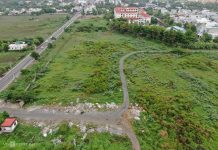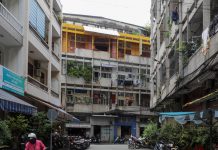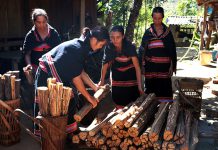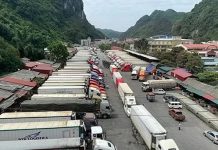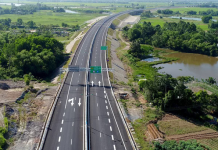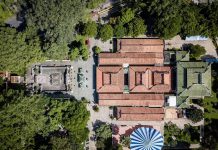Lo Lo Chai is a village in the northern province of Ha Giang that has no modern construction.
 |
Lo Lo Chai Village in Dong Van District seen from the hill that hosts the Lung Cu flagpole, the northernmost point in Vietnam that marks the border with China.
The village nestles in the rocky plateau of the mountainous province of Ha Giang.
 |
Visitors to the village can easily spot the flagpole, which is just 1.4 kilometers away.
 |
The main road that leads to the village center.
 |
In the last three years, Lo Lo Chai has become a cultural tourism village with homestay facilities. It is also a showpiece for Dong Van Plateau architecture.
The homestays have been designed and renovated on the existing foundations of houses built by the Lo Lo ethnic minority group with earthen walls, clay title roofs and stone fences.
 |
The open area where many cultural activities and performances of the Lo Lo people take place on weekend evenings.
 |
The Cuc Bac Café, meaning the northernmost point café, has become a famous landmark in the village.
Yasushi Ogura, a Japanaese man, who fell in love with the beauty of Lung Cu, built the coffee shop to boost community-based tourism, improving the lives of the local indigenous people.
 |
Ogura invested in its furniture and invited people to teach Luc Thi Van, owner of the building, basic English communication as well as how to make coffee and drinks. All business activities are now handled by Van and her husband.
 |
The gate leading to the house, also the café, is lined by stone fences. It has a tiled-roof entrance over which a peach tree casts its shade.
 |
The coffee shop presents the traditional architecture of the Lo Lo people, earthen walls, wooden pillars and clay tile roofs. Many tourists are surprised that in this remote area, they can get delicious drinks and even use wifi.
One visitor posed a rhetorical question: “What is more wonderful than enjoying some coffee next to the country’s border and enjoying the peaceful culture of Lo Lo Chai Village, and some of the things that are gradually being lost in the Dong Van Plateau because of the tourism boom?”



